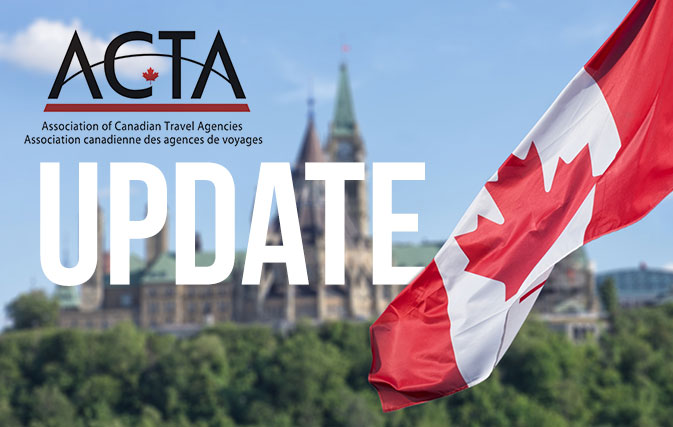TORONTO — Prime Minister Justin Trudeau’s announcement that CRB will be extended for another 12 weeks, and EI for another 24 weeks, is welcome news, says ACTA, as the organization works to do everything it can to help travel agencies survive the pandemic.
But the extension falls short of what is needed for the retail travel industry, says ACTA President Wendy Paradis.
Solvency for travel agencies and travel agents is ACTA’s primary concern right now – and the main focus of all of its lobbying and advocacy efforts.
The CRB extension only requires a regulatory change, and will greatly help Independent Travel Agents, she adds. The EI extension requires a legislative change, making it a more complex process.
“The many new restrictions and requirements introduced by the federal government have further delayed the recovery for the industry – and effectively shut down travel for now,” says Paradis.
“Our message to the government is plain and simple, our industry needs financial support now and well into the future,” she adds.
ACTA has highlighted the need for an extension to the CRB in every single government meeting this year, notes Paradis, even if that was not the topic of discussion.
“We have been lobbying extensively for this knowing it was the next significant aid program to expire” she says. ”We are aware that for many independent travel agents, this is their only source of income right now.”
“In light of all of the travel restrictions currently in place and the lag time for recovery once restrictions are eased, ACTA will continue to actively advocate on behalf of independent travel agents that the CRB continue until Sept. 30, 2021 or until 90 days after travel restrictions have been eased,” she said.
ACTA is also asking the government to make as many financial support programs available to as many travel agencies and independent travel agents as possible.
“Too many travel agencies, travel agents and independent travel agents are coming up against a lot of red tape and roadblocks,” says Paradis. “The financial situation for our industry is dire and our industry should be eligible for all aid programs at the highest levels.”
“We need extensions to all programs well into the fall of 2021 or beyond,” she added.
ACTA has finalized its 2021 Tourism and Travel Industry Recovery Plan, as a submission to the federal government as part of the budget planning process.
The submission was sent last week to the key ministries ACTA works with, and in preparing the submission, ACTA worked in close collaboration with the Hardest Hit Coalition to ensure that the industry is aligned with the other hardest hit industries in its submission, for maximum impact.
ACTA’s plan was “customized for travel agencies, travel agents and independent travel agents,” notes Paradis.
The submission outlines a 7-point plan for travel agency and travel agent support and recovery, with the following 7 priorities:
1. Extension of the Canada Recovery Benefit (CRB) and Employment Insurance (EI) programs
2. Aid to cover commission recall
3. Increase and extension to Canada Emergency Wage Subsidy (CEWS)
4. Amendments to and extension of the Canada Emergency Rent Subsidy (CERS)
5. Ensure HASCAP and other support programs such as the Regional Relief and Recovery Fund (RRRF) and the Canada Emergency Business Account (CEBA) loan programs, work for all “hardest hit” businesses including home-based, independent travel agent businesses
6. Work with industry to develop clear criteria for re-opening borders and easing travel restrictions, through rapid testing and establish vaccine documentation options to reduce or eliminate the 14-day quarantine
7. Incentivize travel through tax credits and promote travel agents
ACTA’s entire plan can be found here.

